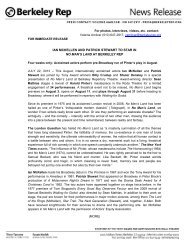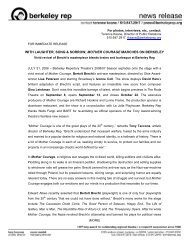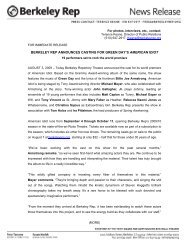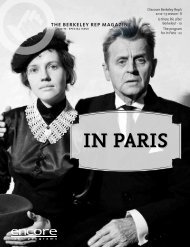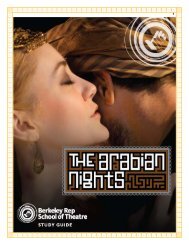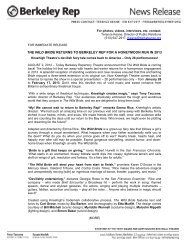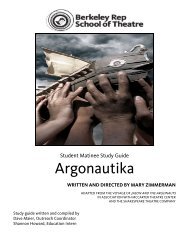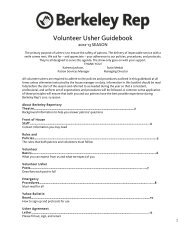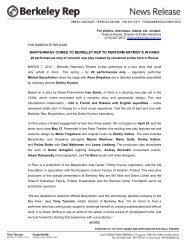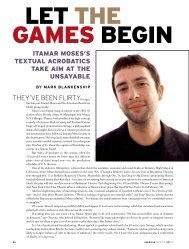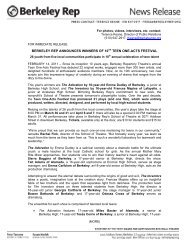the berkeley rep magazine - Berkeley Repertory Theatre
the berkeley rep magazine - Berkeley Repertory Theatre
the berkeley rep magazine - Berkeley Repertory Theatre
You also want an ePaper? Increase the reach of your titles
YUMPU automatically turns print PDFs into web optimized ePapers that Google loves.
The Greek goddess of memory, Mnemosyne (whose name<br />
gives us <strong>the</strong> words “memory” and “mnemonic”), gave birth to<br />
<strong>the</strong> nine Muses who were patrons of <strong>the</strong> arts and sciences.<br />
events, and oral epics use rhyme and meter to create unique<br />
sound patterns. Music can also be a powerful tool. On a very<br />
basic level, <strong>the</strong>re is <strong>the</strong> unforgettable alphabet song, but <strong>the</strong>re<br />
is also Vedic chanting, which employs complex recitation patterns<br />
and a series of tones that correspond to syllables to help<br />
students memorize astoundingly long texts with incredible<br />
accuracy. Smell has one of <strong>the</strong> most powerful links to memory,<br />
and by extension, so does taste. The distinct odor of latex paint<br />
or <strong>the</strong> singular taste of a strawberry can instantly transport<br />
one to events long past. Perhaps <strong>the</strong> reason for this strong link<br />
between smell, taste, and memory is out of survival—our early<br />
human ancestors were more easily able to identify safe and<br />
unsafe food to eat.<br />
While both scholars and scientists of memory agree that<br />
deliberately creating associations helps us to remember more<br />
easily, some people’s brains create <strong>the</strong>se links involuntarily<br />
whenever <strong>the</strong>y encode information. This condition is called<br />
synes<strong>the</strong>sia, and about 1 in 20 people have some form of it.<br />
Some of <strong>the</strong> most common examples are linking letters and<br />
numbers to color, or music to numbers. There are also more<br />
rare forms, such as <strong>the</strong> synes<strong>the</strong>tes who link taste and touch,<br />
or sound and temperature. It’s not that <strong>the</strong>ir perceptions are<br />
altered—<strong>the</strong>y don’t see and hear things that are not <strong>the</strong>re—<br />
but ra<strong>the</strong>r, that multiple senses are simultaneously stimulated.<br />
Many artists, such as <strong>the</strong> painter Wassily Kandinsky, Duke<br />
Ellington, and Vladimir Nabokov all had some form of synes<strong>the</strong>sia.<br />
In fact, <strong>the</strong> artistic world recognized this concept long<br />
before <strong>the</strong> scientific one did; <strong>the</strong> ancient Greeks wondered<br />
about <strong>the</strong> connection between music and color, and Simonides<br />
closely linked poetry and painting. The Greek goddess<br />
of memory, Mnemosyne (whose name gives us <strong>the</strong> words<br />
“memory” and “mnemonic”), gave birth to <strong>the</strong> nine Muses<br />
who were patrons of <strong>the</strong> arts and sciences.<br />
These connections between senses, whe<strong>the</strong>r purposeful<br />
or involuntary, not only assist with memory recall, but also<br />
have had a profound impact on art. For instance, <strong>the</strong> composition<br />
of epic poems like The Iliad, The Odyssey, Beowulf, and <strong>the</strong><br />
Ramayana actually make <strong>the</strong>m easier to remember. Figurative<br />
language similes (his shield was as golden as <strong>the</strong> sun) and metaphors<br />
(his shield was <strong>the</strong> sun) create links between <strong>the</strong> senses<br />
and describe abstract concepts, while o<strong>the</strong>r poetic devices like<br />
<strong>rep</strong>etition, alliteration, and anti<strong>the</strong>sis add fur<strong>the</strong>r aural harmony.<br />
Verse creates an underlying backbone. The meter helps<br />
you to lock into a rhythmic pattern, rhyme offers clues about<br />
what word comes next—it is easier to remember <strong>the</strong> word<br />
“mountain” when you know that you need a two-syllable word<br />
that rhymes with “fountain,” particularly if you bolster it with<br />
<strong>the</strong> image of a spring gushing out of a rocky crevice.<br />
Yet it would be extremely difficult to have <strong>the</strong> same kind<br />
of encyclopedic memory for literature and drama that <strong>the</strong><br />
ancient Greeks did, because our novels, poetry, and plays grew<br />
out of a global society that largely depends on writing. They<br />
are not built to be spoken aloud or remembered by rote. Back<br />
in <strong>the</strong> misty days of yore, <strong>the</strong> only way to remember something<br />
was to pass it down orally, so only <strong>the</strong> most important,<br />
elemental aspects of a culture would be transmitted. Ancient<br />
epics may give us an insight into <strong>the</strong> world of <strong>the</strong>ir composition,<br />
but rarely do <strong>the</strong>y give us a sense of <strong>the</strong> individuals who<br />
lived <strong>the</strong>re. Technological advances in <strong>the</strong> past 150 years or so<br />
have made it possible to include a diverse range of personal<br />
stories in a greater historical narrative; even though it’s no longer<br />
necessary to preserve information orally, <strong>the</strong>re still seems<br />
to be a need to hear what someone has to say. In <strong>the</strong> 1930s,<br />
for example, <strong>the</strong> Civilian Conservation Corps traveled around<br />
<strong>the</strong> country recording <strong>the</strong> oral accounts of people who had<br />
survived slavery or <strong>the</strong> American Civil War. Today, initiatives<br />
like StoryCorps make professional-quality recordings of ordinary<br />
Americans telling <strong>the</strong>ir life stories. From immortal legends<br />
about <strong>the</strong> Trojan War to <strong>the</strong> words of an anonymous veteran<br />
on a Depression-era recording or <strong>the</strong> video blog of a soldier<br />
fighting abroad, our stories are a profound point of connection<br />
to our earlier selves and to <strong>the</strong> rest of humankind, both now<br />
and in <strong>the</strong> future. We want to remember, and we want o<strong>the</strong>rs<br />
to remember us too.<br />
2012–13 · ISSUE 2 · <strong>the</strong> <strong>berkeley</strong> <strong>rep</strong> <strong>magazine</strong> · 19



